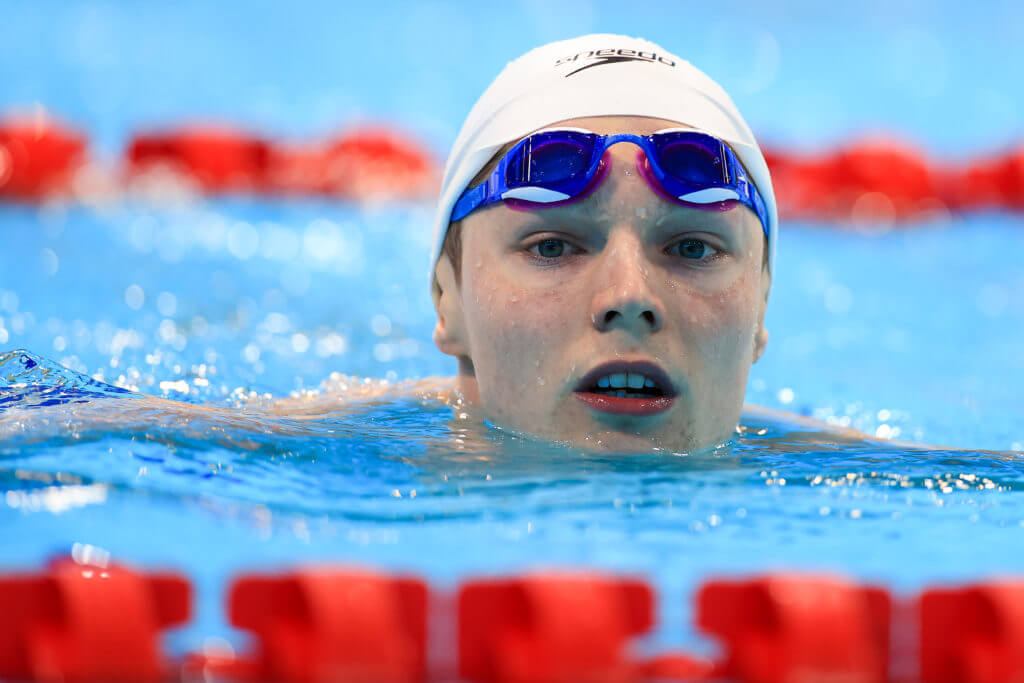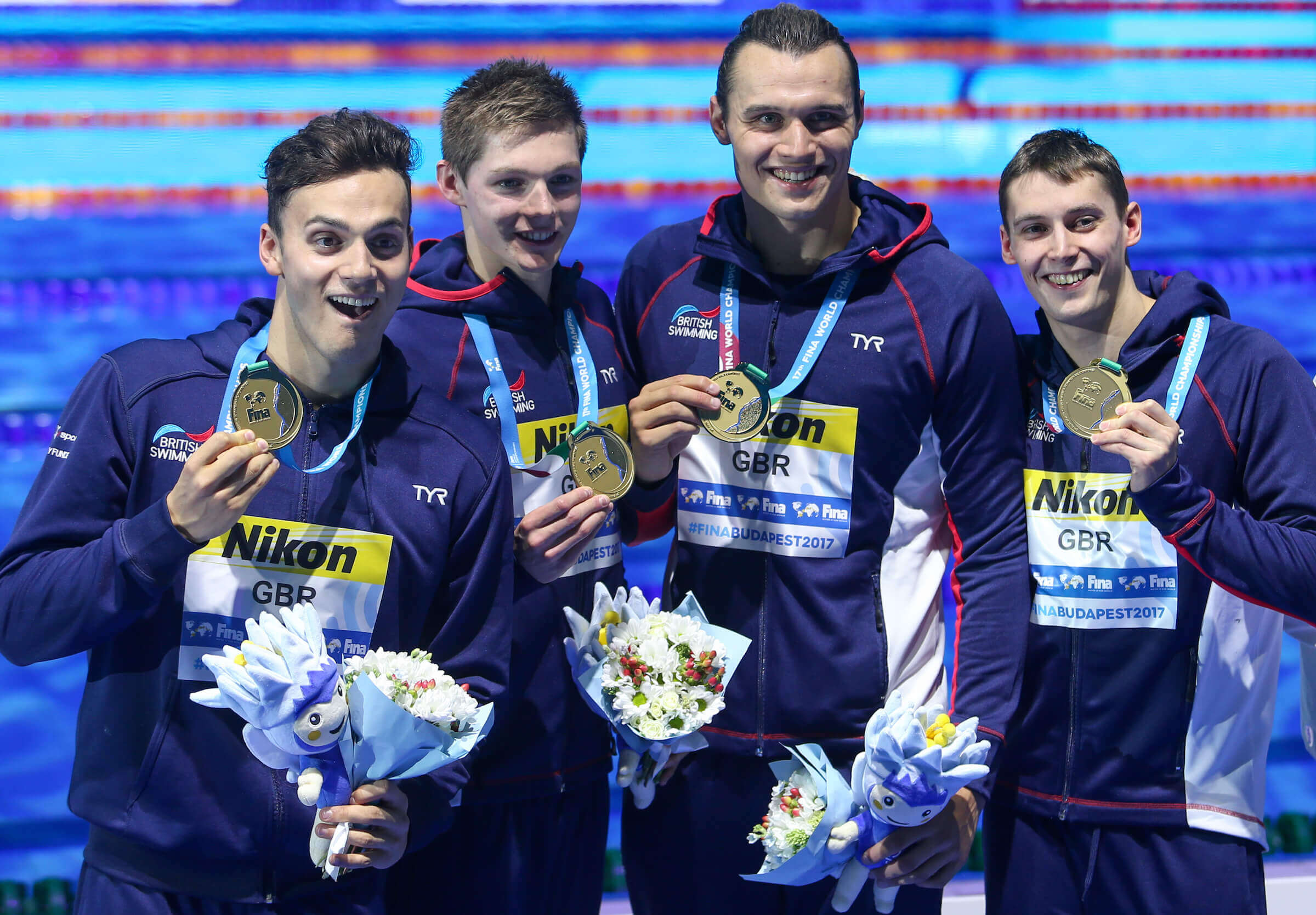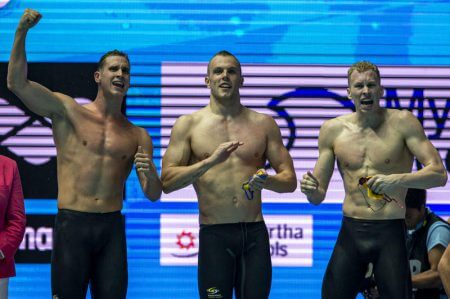U.S. Concern? How the Olympic Men’s 800 Freestyle Relay is Shaping Up

Editorial content for the 2021 Tokyo Olympic Games coverage is sponsored by GMX7.
See full event coverage. Follow GMX7 on Instagram at @GMX7training #gmx7

At the last World Championships, Duncan Scott uncorked one of the most stunning relay performances in recent memory as he anchored the British men’s 400 medley relay past Nathan Adrian and the United States to win a gold medal, his 46.14 anchor split the second-fastest in history. But heading into the 2021 Olympics, Scott and the British men might have their best chance at a relay gold medal in the 800 free relay.
Great Britain has won just 10 Olympic gold medals in men’s swimming and only one relay gold medal—the first ever relay gold medal, actually, when the 800 free relay was introduced at the 1912 Olympics in London. But the British men took silver in the event at the 2016 Olympics and won gold medals at the 2015 and 2017 World Championships before finishing a surprising fifth in 2019. But times from Britain’s recent Olympic Trials make a convincing argument that the Brits will be the favorite for gold in Tokyo.
The Russian men have also posted some sharp times at their Trials this year, and Australia’s men are the reigning world champions with a strong core of young 200 freestylers. And where does that leave the United States, winners of the last four Olympic golds in this race?
Great Britain

The British men won gold in the men’s 800 free relay at the 2017 FINA World Championships — Photo Courtesy: SIPA USA
The 200 free final at Britain’s national championships last Sunday was a warning shot as Scott and Tom Dean each made a leap into the next realm of men’s 200 freestyles. Scott swam a time of 1:44.47, and Dean finished in 1:44.58, moving the two men to ninth and 10th-fastest ever, respectively. Both were much faster than the 200 free world title-winning time of 1:44.93 from 2019, and since 2018, only Danas Rapsys (1:44.38) has swum quicker.
Behind the top two, 18-year-old Matt Richards swam a time of 1:45.77 to finish third, and James Guy, the 2015 world champion in the event, took fourth in 1:46.04. Guy has swum in the 1:45-range on numerous occasions, and his best-ever relay split, a 1:43.80 from the 2017 World Championships, is one of the best ever. Calum Jarvis provides a depth piece after he took fifth in 1:46.47. That’s about as complete a relay squad as a country could have leading into the Olympics.
Russia
Just weeks before Britain’s remarkable relay performances, the Russian men did not crack into 1:44 territory, but they posted enough 1:45s to establish themselves as very worthy contenders. Martin Malyutin won the race in 1:45.18, followed by Ivan Girev (1:45.68), Aleksandr Shchegolev (1:45.82) and Aleksandr Krasnykh (1:45.86). Behind them were Daniil Shatalov (1:46.33) and Mikhail Dovgalyuk (1:46.36). Dovgalyuk has actually led off Russia’s quartets at both the 2017 and 2019 World Championships, both of which have won silver medals, and he has swum as quick as 1:45.56 back in 2019.
Australia

Alexander Graham, Kyle Chalmers and Clyde Lewis celebrate after Australia won gold in the men’s 800 free relay at the 2019 FINA World Championships — Photo Courtesy: Patrick B. Kraemer
The reigning world champions have yet to select their Olympic team, but the Australians pulled off the most surprising relay win of the 2019 World Championships in this event. Clyde Lewis is the second-fastest Australian man in history behind Ian Thorpe after he swam a 1:44.90 in the individual 200 free semifinals at Worlds, and he was joined on the quartet by 100 free Olympic gold medalist Kyle Chalmers, Alexander Graham and 400 free Olympic gold medalist Mack Horton. Horton anchored in 1:44.85 to pull away and win gold by more than a second.
The top Australian performances in the past year came in December, when Graham swam a 1:45.69 in Brisbane and 20-year-old Elijah Winnington followed just behind in 1:45.79. That’s at least five men who have 1:45 or 1:44 potential, and we will see just how fast the Australians can swim at their Trials in June.
United States
While the Americans do have four straight Olympic gold medal-winning 800 free relays, each of those squads have featured Michael Phelps and Ryan Lochte. Now, Phelps is retired, and while Lochte is competing, he has not posted a globally competitive 200 free since 2016. The Americans nabbed a bronze medal at the 2019 World Championships behind the likes of Andrew Seliskar, Blake Pieroni, Zach Apple and Townley Haas. Pieroni had the quickest American split at 1:44.98, and Haas, who was not close to his best form in 2019, anchored in 1:45.16 to beat Italy by just three hundredths for the final podium spot.
This year, Caeleb Dressel is expected to throw his hat into the 200 free, and 200-yard free NCAA champion Kieran Smith should be able to improve on his 2019 best of 1:46.21. Swimmers like Dean Farris and Luca Urlando could factor in here as well. Regardless, the Americans will need a lot of big drops at their Olympic Trials to jump into contention for gold or even for a medal.
Others
Italy took fourth at the World Championships—three hundredths behind the U.S. and three hundredths ahead of Britain—with Filippo Megli, distance world champion Gabriele Detti, Stefano Ballo and Stefano Di Cola all splitting 1:45s, but only Megli has been 1:45 from a flat start in the past two years. The Italians are probably no more than a spoiler here.
China took sixth at World Championships, but the fate of this relay squad will depend on whether Sun Yang is allowed to compete in Tokyo. Japan typically has a strong 800 free relay squad, but beyond Katsuhiro Matsumoto, the 200 free silver medalist from Worlds who swam a 1:44.65 in March, the host nation doesn’t have much depth. So we should expect the Olympic medals to come from some combination of Great Britain, Russia, Australia and the United States.
Men’s 800 Free Relay Hypotheticals
Since Australia and the U.S. have not swum their Trials yet this year, these composites will consider all times swum since 2019. Here’s what we get when adding up the best flat-start times from each country.
Great Britain: Scott 1:44.47 + Dean 1:44.58 + Richards 1:45.77 + Guy 1:45.95 = 7:00.77
Russia: Malyutin 1:45.18 + Girev 1:45.49 + Dovgalyuk 1:45.56 + Shchegolev 1:45.82 = 7:02.05
Australia: Lewis 1:44.90 + Graham 1:45.69 + Chalmers 1:45.73 + Winnington 1:45.79 = 7:02.11
United States: Seliskar 1:45.71 + Haas 1:45.92 + Smith 1:46.21 + Farris 1:46.45 = 7:04.29
Again, these hypotheticals will change when Australia and the U.S. swim their taper meets. Australia’s Horton and the U.S.’s Pieroni don’t factor into these rankings yet despite both swimming 1:44 splits a few years ago. But at this stage, it’s clear that Great Britain ranks a good bit ahead of the closest competition. It’s just as clear that the United States is fourth, and not a close fourth.




